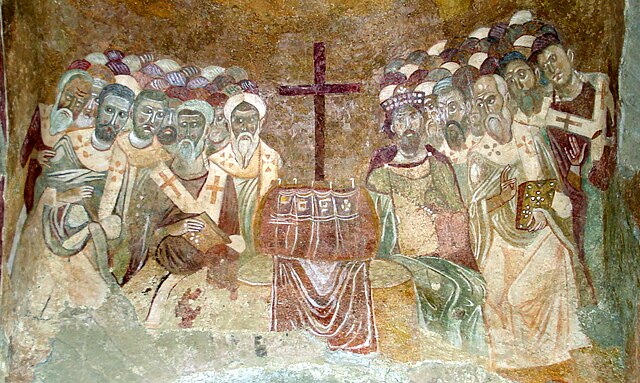Someone posted this on Facebook this morning, and I re-posted it there, because it epitomizes everything I’ve been saying about the course of liberal Christianity. A new archbishop has been elected for the Church of Sweden – its first woman archbishop, Antje Jackelén. At another time I might have had something to say about women’s ordination, but that issue is least of the problems here. Dispatch-International’s story says:
Like kings, all bishops have their own motto and Jackelén chose ”God is greater”. If that sounds familiar, it may be due to the fact that an Arabic translation renders it as ”Allahu akbar”. There are those who believe that her choice is far from random – but very deliberate.
Many have been taken aback by the theological opinions Jackelén revealed during a questioning in Uppsala on October 1. The candidates for the highest position in the Swedish church were asked if they thought Jesus presented a truer picture of God than Muhammed. With her evasive answer Jackelén suddenly emerged as the bishop who couldn’t choose between Jesus and Muhammed. This provoked strong reactions on some editorial pages.
Kyrkans Tidning thought that the bishop’s answer might indicate that Christ is being relegated to the margins of the Church of Sweden and Dagens Nyheter encouraged the candidates to show some theological backbone. The editorial writer at the newspaper Dagen wrote that it is time to accept the idea of a split within the church – between Christians and those who think all religions are equally good.
Now let me say that this article seems just a little sensationalist to me. Its title, “Swedish Archbishop Prefers Allah,” for instance, is an exaggeration of the actual content of the text. Judging by this account, Archbishop Jackelén hasn’t said she prefers Allah to Jesus. She just refuses to make the choice.
I am fairly certain that, in the historical Christian church at all times up till the 20th Century, one thing that would always have disqualified any candidate for a bishopric is a refusal to confess Jesus Christ as Lord. That’s just basic, like failing an eye test for an airline pilot.
Which means that, as far as I can see, the Swedish church has apostasized in electing this woman. Anyone who holds to the faith of the creeds ought to leave that church. At a full run.
And don’t think it’s not happening here. I am confident, on the basis of a lifetime working in churches both liberal and conservative, that there are many church leaders and seminary professors in America (Ms. Jackelén in fact taught at the Lutheran seminary at the University of Chicago for a time) who believe – or disbelieve – in pretty much the same way.
At the risk of sounding like somebody from Left Behind, I declare ours the day of the Great Apostasy.
Like this:
Like Loading...





